|
|
|
|
|
|
|
|
Today's Congressional Action:
The House and Senate are not in session.
|
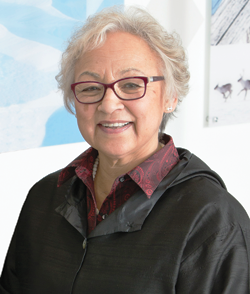 President Appoints Longtime Alaska Native Leader to US Arctic Research Commission. President Appoints Longtime Alaska Native Leader to US Arctic Research Commission. President Obama last week appointed longtime Alaska Native Corporation leader Marie Kasaŋnaaluk Greene to the commission that advises the president and Congress on Arctic research. "She brings a tremendous degree of not only experience but knowledge and understanding of the Arctic," says Fran Ulmer, chair of the U.S. Arctic Research Commission. Ulmer says Greene's knowledge of the Arctic is informed both by being raised there and through her executive experience, including 13 years as president and CEO of Kotzebue-based NANA Corporation. KUAC
The Food Desert of the North. Rifle fire echoes throughout the bay, signaling surfacing whales. Their dark humps briefly crest in the slight chop, leaving only seconds for hunters to take aim. As freighter canoes tack across the water in pursuit, shrouds of mist pull back, revealing snow-dusted cliffs. "It is like a war," Clyde River resident Sam Iqaqrialu says of the autumn narwhal harvest in Canada's high Arctic. Al Jazeera
Watch 25 Years of Arctic Sea Ice Melt in One Minute. Recent social media posts by The Climate Reality Project are featuring the National Oceanic and Atmospheric Administration (NOAA) one-minute video animation that tracks the relative amount of ice of different ages from 1987 through early November 2014. According to NOAA, decades ago, the majority of the Arctic's winter ice pack was made up of thick, perennial ice. Today, very old ice is extremely rare. Check out the video, produced by the Climate.gov team and based on data provided by Mark Tschudi. EcoWatch
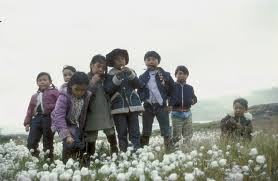 Inuit Want Arctic Policy to Protect Their Culture. Inuit Want Arctic Policy to Protect Their Culture. Alaska Inuit hunter John Goodwin for decades has hunted oogruk, the bearded seal, a marine mammal prized for its meat, oil and hide. The largest of Alaska's ice seals uses sea ice to rest and birth pups, and after the long winter, when ice breaks into floes, there's a window of opportunity for Goodwin to leave his home in Kotzebue and motor his boat between ice panels, shoot seals and butcher them before they migrate north through the Bering Strait. The Star
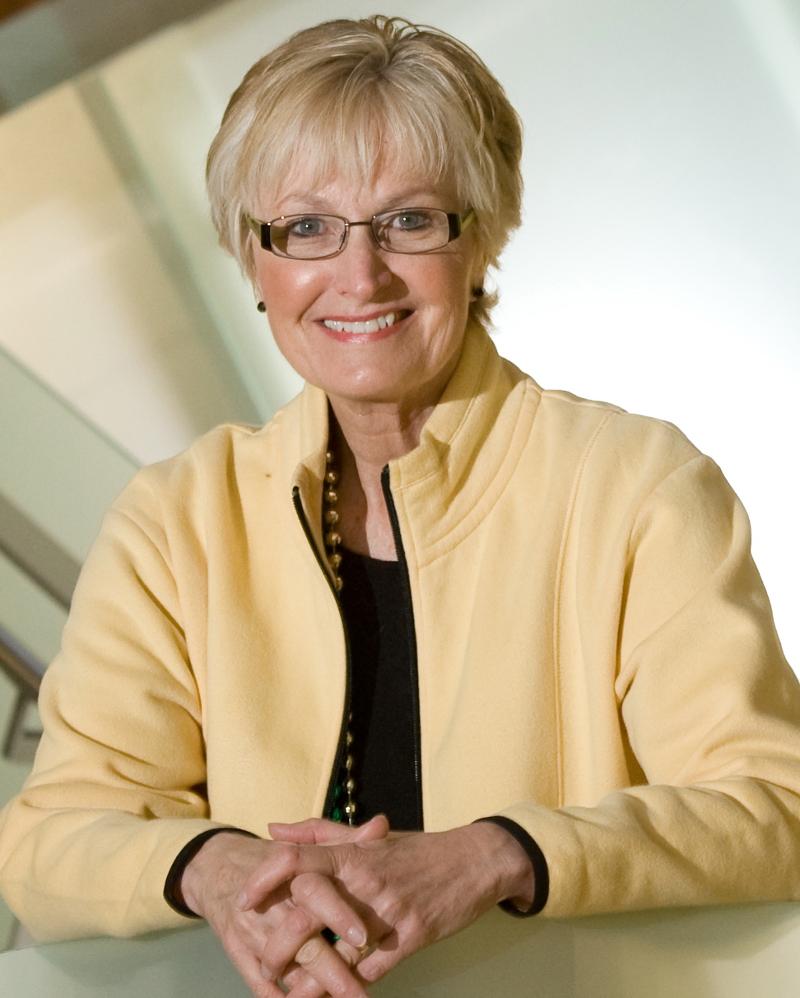 Q&A With Fran Ulmer. Q&A With Fran Ulmer. A familiar name to many Alaskans, Fran Ulmer has been advising policymakers and making policy in our state and nationally for years. In her various roles as a former lieutenant governor of Alaska under Tony Knowles; Juneau's mayor; chancellor of the University of Alaska Anchorage; and as a public policy professor there, she has dedicated her professional life to educating both the public and lawmakers about Alaska. She was appointed to her current position as the chair of the United States Arctic Research Commission (USARC) by President Barack Obama in 2011, and she will continue to serve in the role until 2019. The purpose of the commission is to create reports and make recommendations to our nation's lawmakers concerning both the domestic and international Arctic. Ulmer travels regularly to the Arctic to learn more about the people and the land. Alaska Dispatch News
The Next Frontier: UVA Architecture Professors, Students Design for the Arctic. This semester, 14 University of Virginia architecture and landscape architecture undergraduate and graduate students spent 10 days on Norwegian Arctic islands 800 miles north of the Arctic Circle, learning how to design for a harsh, dynamic environment that many see as the next great frontier of development. Assistant architecture professor Matthew Jull and landscape architecture lecturer Leena Cho planned the trip to involve students in international conversations about sustainably developing the Arctic as sea ice recedes, shipping routes open and demand for natural resources and tourism grows. Augusta Free Press
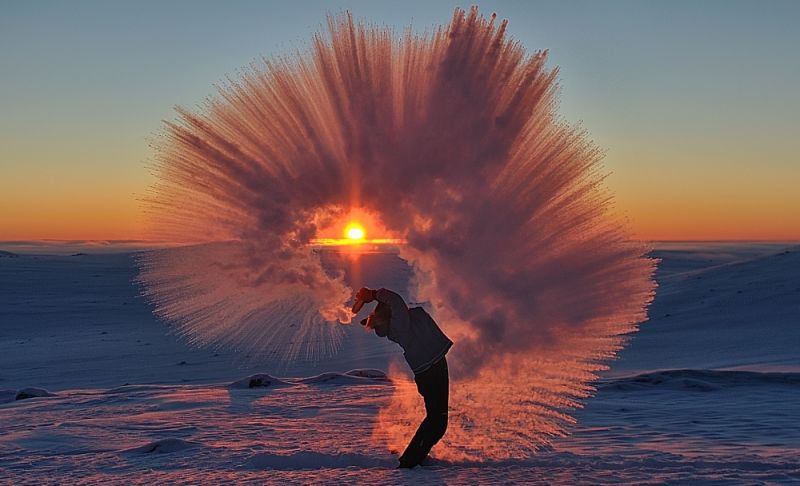 How Bad are Arctic Winters? One Photo Says it All. How Bad are Arctic Winters? One Photo Says it All. If you were idly wondering what it might be like to visit the High Canadian Arctic in the dead of winter, this incredible new shot of a cup of hot tea freezing in mid-air sums it up nicely: Cold. As. Hell. The breathtaking image above was captured by photographer Michael Davies and his buddy Markus, as they stood at the top of a mountain near Pangnirtung, a 1,400-strong Inuit village located just 12 miles south of Arctic Circle. Making sure to align their icy excursion with the 2.5 hours of winter sunlight, the two took a Ski-Doo to high ground so that they could glean a few extra rays off the horizon. Gizmodo
Polar Bears Must Work Harder On Faster Sea Ice Treadmill. Thinner sea ice is getting pushed farther by Arctic winds, which makes polar bears walk more to stay in the same place, increasing their need for food. Polar bears live on floating rafts of sea ice, hunting for seals. But in the Arctic Ocean north of Alaska, the cold polar wind constantly blows that ice from east to west. Which means that the polar bears there are on a kind of treadmill. Scientific American
Management Questions Raised by Caribou Herd Decline. When the Western Arctic Herd came through this year, it was full of fat, healthy caribou. Hunters saw lots of calves, and they looked healthy, too. And the herd traveled close to communities like Kotzebue, making for easy hunting. But while caribou continue to fill many freezers in the region this year, most know the truth - the herd is declining to a level that may well require more stringent hunting restrictions than last year. The question of how to manage a herd so vital to the subsistence-centered lives of most in the region was at the center of several days of meetings in Anchorage this week as the Western Arctic Caribou Herd Working Group and regional stakeholders gathered to discuss the conundrum. The Arctic Sounder
|
Legislative Action
No Arctic legislation was formally considered last Thursday.
|
|
Future Events
"Arctic Matters" day at the National Academy of Sciences, January 14th, 2016 (Washington, DC, USA)This symposium is part of an ongoing initiative of the National Academies of Science Polar Research Board to expand public understanding of why the dramatic changes affecting the Arctic region ultimately matter to us all. The agenda features engaging presentations and discussions with top Arctic science and policy experts, and displays and interactive exhibits that illustrate Arctic change and its global impacts. The event is free and open to the public. There are sponsorship opportunities, and a call for exhibitor applications. Audience space is limited, so register today; and please encourage your friends, neighbors, and colleagues to participate-as our goal is to reach well beyond the small circle of specialists who typically attend Arctic-themed events in the DC area.
The U.S. Arctic Research Commission is the primary sponsor of this event.
** New this week** East-West Arctic Cooperation During Times of Global Tension, January 15, 2016. Can the United States and its allies cooperate with Russia, China and other Asian nations during times of tense relations - or will cooperation on common interests in the Arctic succumb to the more familiar geopolitical tensions of the Cold War era? Stimson will host this event. Vice Admiral Charles Michel, the Vice Commandant of the United States Coast Guard, will deliver a keynote speech on the new Arctic Coast Guard Forum established to promote maritime safety and security cooperation in the Arctic. Following VAdm. Michel's presentation, a panel of experts will discuss the progress and challenges to future East-West cooperation in the Arctic region.
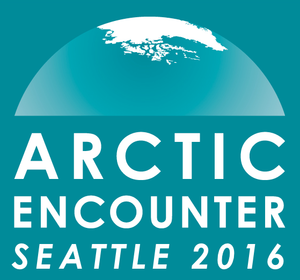 Building upon the preceding Arctic Encounter event in Paris, the third annual Arctic Encounter Symposium (AES) in Seattle, Washington will convene policymakers, industry leaders, and leading experts to confront the leading issues in Arctic policy, innovation, and development. The AES mission is to raise awareness, engage challenges, and develop solutions for the future of a region and a people. The two-day program includes two keynote luncheons, expert plenary sessions, break out sessions, a networking cocktail reception and seated dinner. A closing reception will take place at the conclusion of the program. Building upon the preceding Arctic Encounter event in Paris, the third annual Arctic Encounter Symposium (AES) in Seattle, Washington will convene policymakers, industry leaders, and leading experts to confront the leading issues in Arctic policy, innovation, and development. The AES mission is to raise awareness, engage challenges, and develop solutions for the future of a region and a people. The two-day program includes two keynote luncheons, expert plenary sessions, break out sessions, a networking cocktail reception and seated dinner. A closing reception will take place at the conclusion of the program.
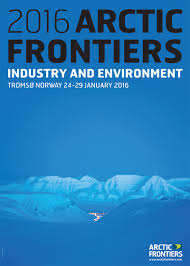 2016 Arctic Frontiers, January 24-29, 2015 (Tromso, Norway).The Arctic is a global crossroad between commercial and environmental interests. The region holds substantial natural resources and many actors are investigating ways to utilise these for economic gain. Others view the Arctic as a particularly pristine and vulnerable environment and highlight the need to limit industrial development. Arctic Frontiers 2016 will discuss the balance between resource utilisation and preservation, and between industrial and environmental interests in the Arctic. Envisioning a well-planned, well-governed, and sustainable development in the Arctic, how can improved Arctic stewardship help balance environmental concerns with industrial expansion? How can the industrial footprints from future business activities be minimised? And last, but not least, what role will existing and emerging technologies play in making industrial development profitable and environmentally friendly, securing a sustainable growth scenario for Arctic communities? 2016 Arctic Frontiers, January 24-29, 2015 (Tromso, Norway).The Arctic is a global crossroad between commercial and environmental interests. The region holds substantial natural resources and many actors are investigating ways to utilise these for economic gain. Others view the Arctic as a particularly pristine and vulnerable environment and highlight the need to limit industrial development. Arctic Frontiers 2016 will discuss the balance between resource utilisation and preservation, and between industrial and environmental interests in the Arctic. Envisioning a well-planned, well-governed, and sustainable development in the Arctic, how can improved Arctic stewardship help balance environmental concerns with industrial expansion? How can the industrial footprints from future business activities be minimised? And last, but not least, what role will existing and emerging technologies play in making industrial development profitable and environmentally friendly, securing a sustainable growth scenario for Arctic communities?
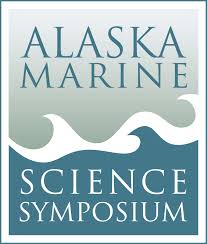
** New this week ** Alaska Forum on the Environment, February 8-12, 2016 (Anchorage, Alaska, USA). The Alaska Forum on the Environment (AFE) is Alaska's largest statewide gathering of environmental professionals from government agencies, non-profit and for-profit businesses, community leaders, Alaskan youth, conservationists, biologists and community elders. The diversity of attendees and comprehensive agenda sets this conference apart from any other. Each year there are over 80 technical breakout sessions and sensational Keynote Events. There will be a full week of sessions on climate change, energy, environmental regulations, cleanup and remediation, fish & wildlife, solid waste, and more.
5th Annual Fletcher Opening Arctic Conference, March 12, 2016. The Opening Arctic Conference builds on the Fletcher School's Warming Arctic International Inquiry series, to bring together high-level thought leaders from across disciplines, Fletcher's hallmark. Staged annually, Fletcher's event continues to address the foreign policy, economic, environmental and security implications of the opening Arctic, while dispelling myths.
** New this week** Alaska Rural Energy Conference, April 26-28, 2016 (Fairbanks, Alaska, USA). The Alaska Rural Energy Conference is a three day event offering a large variety of technical sessions covering new and ongoing energy projects in Alaska, as well as new technologies and needs for Alaska's remote communities. Building on the growing success, the Alaska Energy Authority and the Alaska Center for Energy and Power have joined forces again to organize and sponsor the 10th annual Alaska Rural Energy Conference.
14th IATS Seminar, June 19-25, 2016 (Bergen, Norway). The University of Bergen (UiB) is honored to host the 14th IATS Seminar in Bergen, Norway, from Sunday 19 to Saturday 25 June 2016 in co-operation with the Network for University Co-operation Tibet-Norway, an academic network with the universities of Oslo, Bergen and Tromsų as partners. The convenor is Professor Hanna Havnevik, Department of Culture Studies and Oriental Languages, University of Oslo, and Chair of the Network.
Inuit traditions are a repository of Inuit culture and a primary expression of Inuit identity. The theme for the 2016 Inuit Studies Conference invites Elders, knowledge-bearers, researchers, artists, policy-makers, students and others to engage in conversations about the many ways in which traditions shape understanding, while registering social and cultural change. The institutional hosts of "Inuit Traditions," Memorial University of Newfoundland and the Nunatsiavut Government, invite you to contribute to an exchange of knowledge to be held in St. John's, Newfoundland and Labrador, October 7-10, 2016. Presentations on all aspects of Inuit studies will be welcome.
|
|

  
4350 N. Fairfax Drive, Suite 510
Arlington, VA 22203, USA
External links in this publication, and on the USARC's World Wide Web site ( www.arctic.gov) do not constitute endorsement by the US Arctic Research Commission of external Web sites or the information, products or services contained therein. For other than authorized activities, the USARC does not exercise any editorial control over the information you may find at these locations. These links are provided consistent with the stated purpose of this newsletter and the USARC Web site.
|
|
|
|
|
|
|
|
|